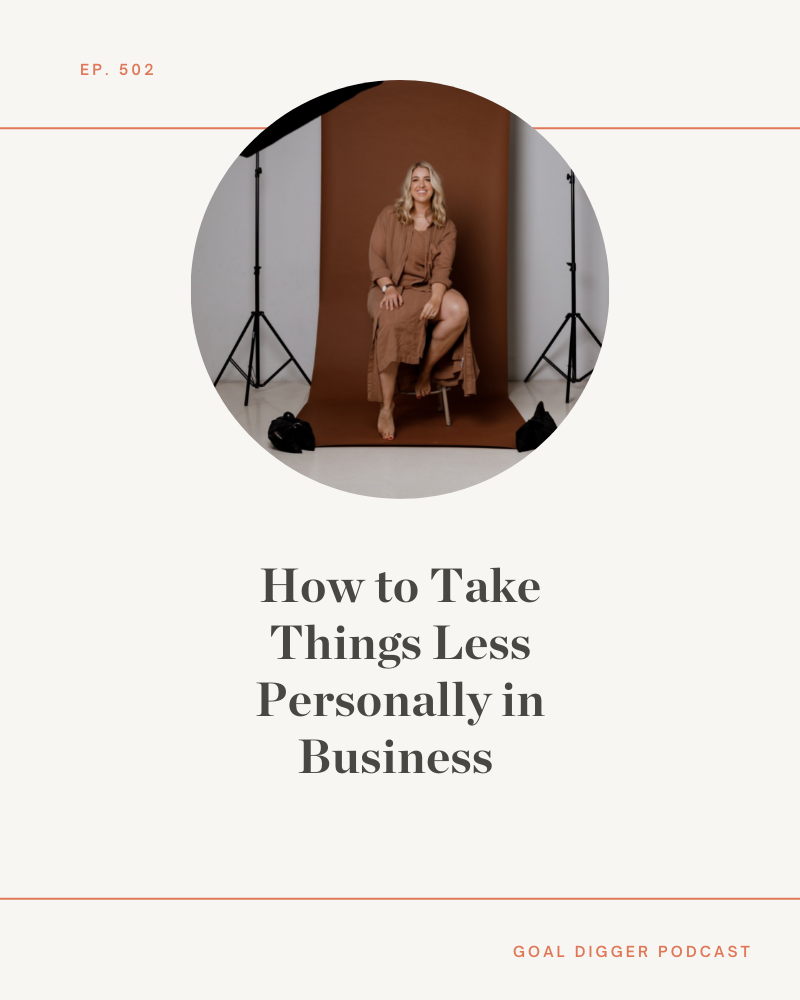
Apple Podcasts | Spotify | Stitcher
From getting copied to feeling judged, receiving nasty comments to watching competitors soar… there are a lot of ways things can feel like a personal attack in business, and it’s natural to feel defensive, protective, competitive, and emotional about your business as you grow it. But when those emotions threaten to hold you back, get in the way of your progress, steamroll your success, or sabotage your creativity, then we’ve got to find healthy ways to deal and cope with our emotions.
I used to waste a lot of time and lose a lot of sleep over business but now I’ve learned to let things go easier, and I know how to differentiate feedback from pure criticism, and how to look at facts and feelings from more of a birds eye view.
So when should we take things personally or choose to brush things off? How do we move forward with confidence and stay on our own personal path as we chase our dreams? It all comes down to a case-by-case scenario, and so today I want to talk about some triggers and situations in running a business that might cause us to tense up or get hurt feelings, and what to do about them in order to move forward, feel at peace, and not sweat the stuff that truly won’t matter in the long run.
Rule of 5
We all know the feeling of starting to get worked up by something that’s frustrating or hurtful. Whether you’ve gotten unkind feedback or see someone who’s totally ripping off your entire brand’s aesthetic, there’s this mama lion tendency in all of us that emerges when we feel “wronged” in our businesses.
It can take a quick scroll down the wrong corner of the web, a nasty email or just a few words in your comments section to start the spiral and all of a sudden you find your pulse racing, your skin getting hot.
For me, my first tendency is to protect and defend. When I feel myself starting to get reactive to something someone else has said or done to affect my business, I always try to revert to the rule of 5, which you’ve likely heard of before. If not, you simply pause whatever you’re doing, take a deep breath and ask yourself: will this matter in 5 minutes, 5 days, 5 weeks, 5 months, and 5 years?
So often I’ll realize that while yes, this thing might still be irritating or hurtful in 5 minutes or even 5 days, oftentimes it won’t matter one iota in 5 weeks, months, or years. I probably won’t even remember most issues that far down the road—heck, I don’t even remember what I had for breakfast a week ago!
It’s such a small and simple practice that can seriously ground you and keep you focused on what matters. I’ve found that gentle perspective shifts like this help to keep me here on earth when I feel myself going down an emotional spiral, and I can pause to remember that so many of the little irritations we encounter as business owners are just hiccups, miscommunications, or truly things that don’t matter, and they’re not indicators of how well we’re performing or where we’re headed.
How to address bad ratings or reviews
First off, if you’re putting yourself and your work out there and you’re attempting to make an impact, you WILL get criticism and you likely will experience a bad review or rating at some point. It can be soul crushing the first time you read negative words about yourself, your work, or the experience someone got.
Choosing how and if you respond can be tricky and my first piece of advice is to not respond or make any decisions immediately. Take some space, take a bit of time, step away from the situation for a bit.
If you feel compelled to respond because the experience shared was clearly a complete misunderstanding or a mixup or something beyond your control, then do so in a respectful manner respecting their words, feeling and experience but supplying a response that also helps clarify or communicate what happened, how you could remedy it, or what your next steps are.
Like for example if someone left a negative review on a product you sold them that arrived broken, but you’re more than willing to send a replacement at no cost. For something like that, I would address it in a public forum as a public response to their review if possible so you can respond, clarify the issue, and offer remediation. Since it’s proven that people do look to reviews to make purchasing decisions, I think having a public polite response with an attempt to remedy and an option to get additional support can go a long way.
Always try to approach it from a place of understanding while stating the facts, for example saying something like, “We are so sorry your product arrived damaged. I understand you are disappointed with this product, and we pride ourselves on delivering high quality products. We would be more than happy to send you a replacement at no cost to you. Please contact us so we can process the replacement and get it sent immediately.”
Now, if you get a review is just plain critical with nothing there for you to help solve or fix, try to step back once more and look at it like it’s your friend’s business again. Is there any truthful feedback you can take from it? Does anything they’re saying hold weight? Is there an opportunity or invitation for you to do better? Take that piece of it and move forward with growth but if it’s just downright mean or created to cut you down, let that go.
A huge thing that has helped me in terms of this is when I can define if it’s truly helpful feedback or intentionally hurtful criticism. Getting honest about which camp the words lie in helps me to know what to do about it. Can I actually take action and grow from the feedback or is this an example of criticism that I need to let go of and move on.
My automatic first response is defensiveness and maybe you’re similar. You want people to like you or respect you or understand your intentions, but when we respond from that place it can sometimes open up more room for criticism. I have learned to not respond from that place and to instead try my best to step back and stay out of it. If something is still truly eating me up or making me lose sleep after a day or two, I might reach out directly to see if the person is willing to have a conversation so we can both lay out our thoughts and clear the air.
It’s important to remember we can’t change anyone else, or their perspective of us. True trolls who are just there to nitpick or be nasty will often stick around if you add fuel to the fire, but if they see their attempts are going ignored, you’ll likely be rid of them much faster than trying to change their mind or reason with them.
Copycats
As someone who has been on the receiving end of copycats countless times, I know how frustrating and aggravating this can be. I actually did an episode ALL about being copied years ago and you can find that by scrolling back to episode number 47 called “What to do When You’ve Been Copied” for a great action plan if you notice someone’s mimicking your stuff.
Something important to remember is that in our digital world, it’s sometimes hard to differentiate being inspired from copying others completely. We see and take in SO much messaging, imagery, and branding all day every day that it’s common to take pieces of things we admire, things that inspire us and use them for our own efforts. But when we notice it’s our stuff getting swiped, it’s easy to get protective and defensive, and rightfully so!
It can be frustrating to feel like your hard work or your creativity is getting ripped off. Whenever this happens, I recommend pausing and going for a walk before doing anything, so you can approach the situation from a clear-headed space and let your emotions cool off. The line between inspiration and copying is very thin, so this requires a clear head before you do anything. First, you need to determine if it’s something that requires legal action like if someone is infringing on your copyrights or impacting your ability to do business, and if so, then the FIRST step is getting in touch with your legal counsel and they can advise and take it from there.
If it’s not really affecting business or legalities, but it’s still clearly a copycat situation, then you have a few options. After I’ve taken a little space, I like to write an email as though it’s to the person who’s copied you but then send it to yourself (or save it in your drafts), and in the email simply express what you’ve noticed, why it’s made you hurt or upset, and then draft a proposed action plan. If you can do any side by side screenshots or share where the similarities felt like copying, it can be helpful to see it illustrated.
Try to position your sentences from an “I feel” standpoint rather than a “you did this, you did that” standpoint to avoid placing blame. Then before doing anything with the email, I like to sit on it for at least 24 hours and wait. After that period of time, you might realize that you worked out your frustrations by simply writing them down, or you might realize it’s important for you to send your communications to the other person. If you can let it go and move on, then my advice is to try to do just that, but if you feel like your frustration is going to fester, it’s probably best to just reach out and share how you feel.
What happens next can be any number of things, they might apologize and come up with a plan to make a change, or they might deny any kind of copying, or they may not respond at all. You need to go in knowing that any of these scenarios could very likely play out and so it’s good to recognize that while sharing your thoughts openly is important, you will never be able to change what someone else is doing or fully get them to see where you’re coming from.
It’s a judgment call on your part whether you’ll feel better sending the correspondence and hopefully finding a resolution, or to simply write down how you feel for your own peace of mind and then move on from there.
Written Agreements
If you’re entering into a project or business with another person or a few other people, things can feel pretty great at the start. Everyone is excited to be creating together — maybe you’re even friends and that’s why you decided to team up and build your dream business together in the first place.
Without dipping into too much pessimism here, I want to remind you that you never feel like you need a contract or formal written agreement with your partner or contributors when things are going well. However, if things ever start to go sour… That’s when you need a contract to protect not only your investment of time and money, but also your relationship. If things are already going south, you’ll be hard pressed to get any ink on a page retroactively.
I’m a stickler for contracts to protect all working and professional relationships that enter my business today. Investing in a contract template (at the very least) or hiring an attorney to draft a specific agreement for your situation is way cheaper upfront than walking through a costly legal battle down the line without a contract in place. Not to mention, if you want to save a friendship or relationship with your partners, a written and signed agreement that details everyone’s roles and responsibilities as well as ways to remedy disputes is the best insurance for those relationships.
The Big Picture
It is HARD work to feel rejected, criticized, or passed by and to still show up with a positive outlook in your business every day. It’s challenging to disconnect your feelings from the very thing you’ve created and put out into the world. So I want to end by acknowledging that some days it WILL feel heavy and all consuming. Some days you won’t be able to cut your emotions from your actions in your business, and that is completely normal.
On those days, just recognize that you are simply doing the best that you can. Do what you can to take care of yourself and your mental health, whether it’s going and reading positive feedback and comments from past clients who LOVED your work, or maybe it’s just totally disconnecting from work altogether for a few hours, putting your phone on airplane mode, and getting out into nature and fresh air for a while.
Do what you need to do to take care of YOU, and I promise you’ll feel a bit better about whatever challenging or hurtful situation you might be facing in business. Yes, it’s “just” business, but oftentimes it IS also personal and that’s okay as long as you have healthy ways to cope, make wise decisions, and continue moving forward with healthy communication.
Thank you to our Goal Digger Sponsors
Learn more about scaling your company without scaling complexity with HubSpot





[…] has a blog post and a podcast about this. Check them out here because it’s the best thing. The gist – run yourself through each of those time periods […]